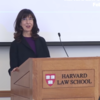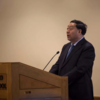环境法
2019
Jun
01
《中国会拯救地球吗?》新书研讨会
2018年秋季学期新闻通讯
2018年春季学期新闻通讯
中国国家电网公司前董事长刘振亚就全球能源互联网在哈佛大学发表公开演讲
2017
Nov
28
. 1998. “China and the United Nations Framework Convention on Climate Change.” In Energizing China: Reconciling Environmental Protection and Economic Growth, . Cambridge, MA: HUCE/Harvard University Press. Publisher's VersionAbstract
. 1996. “Limits of the law in addressing China's environmental dilemma.” Stanford Environmental Law Journal, 16, 1, Pp. 125-148. Publisher's Version
. 2002. “The human dimensions of environmental policy implementation: Air quality in rural China.” Journal of Contemporary China, 11, 32, Pp. 495-513. Publisher's VersionAbstract
1998. Energizing China: Reconciling Environmental Protection and Economic Growth. Cambridge, MA: HUCE/Harvard University Press. Publisher's VersionAbstract
. 2007. “Implementation of voluntary agreements for energy efficiency in China.” Energy Policy, 35, 11, Pp. 5541-5548. Publisher's VersionAbstract
. 1998. “Limits of the law in addressing China's environmental dilemma.” In Energizing China: Reconciling Environmental Protection and Economic Growth, . Cambridge, MA: HUCE/Harvard University Press. Publisher's VersionAbstract
. 2001. “Clean air, clean processes?: The struggle over air pollution law in the People's Republic of China.” Hastings Law Journal, 52, Pp. 703-748. Publisher's Version
2017
Mar
23






